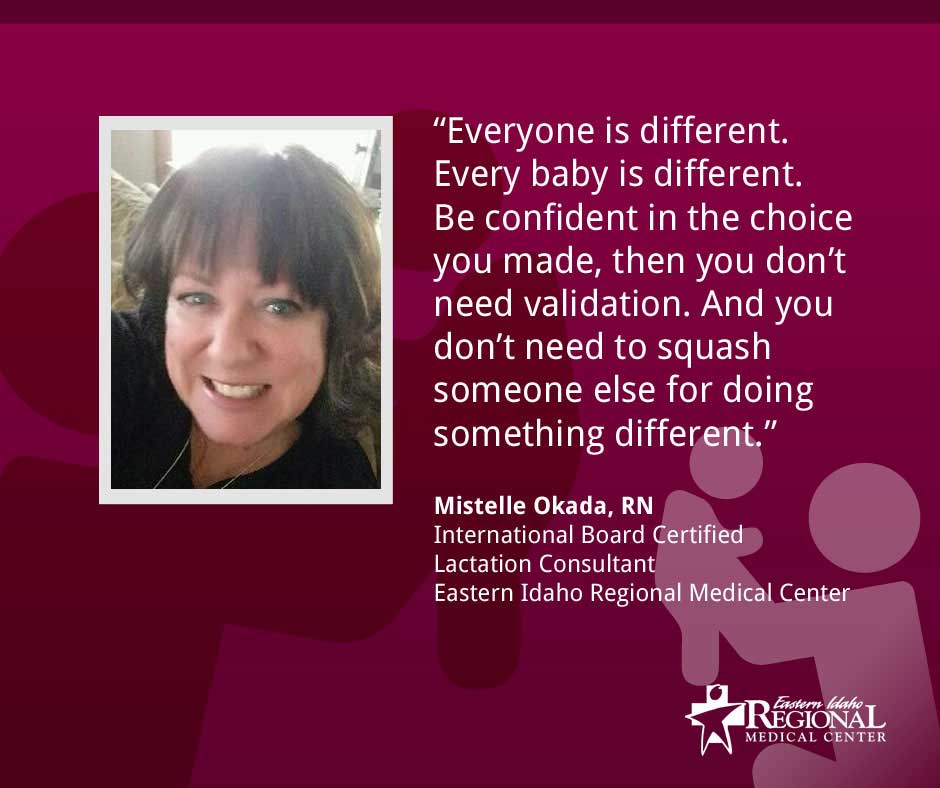A common sore spot among moms is the choice between breastfeeding and formula feeding. Hostility is high. And insults get hurled like: “You're lazy, selfish, and you don't love your child,” if you've made what some consider an inappropriate choice.
It wasn't always like this. Moms used to get good advice from older women, especially relatives, to learn mothering. There was more nurturing and support.
Then, came social media.
“Moms have always been understandably insecure,” says Mistelle Okada, RN and International Board Certified Lactation Consultant for Eastern Idaho Medical Center. “The difference is now, because of social media, you compare your mothering skills against the whole world.”
In an effort to calm the debate, Mistelle steps into the ring to referee and weigh in on the topic.
Q: Why are so many women judgmental about breastfeeding vs. formula feeding?
Mistelle: Insecurity drives the problem. Moms need to defend their choices. So, if someone makes a different choice, they feel the need to attack it. Otherwise, they wonder if their choice was right.
Now, moms use social media to see what everyone else is doing. They choose a side and then bash the other side because the others clearly made a bad choice.
The comment storm that erupts from a simple “mommy” status update is personal. And it hurts deeply at a time when you're severely emotional and sensitive.
Many young moms opt to leave social media until their kids are older, so their parenting choices aren't questioned as passionately.
Q: So, how do you defend your decision?
Mistelle: To defend your decision, you have to feel secure in the choice you made, whether it's breastfeeding or formula feeding.
Then, I think the best response is, “Gee, I'm sorry you feel that way. I made a choice based on what was best for my family, and I'd appreciate your respect.”
Don't get into a who chose best validating thing. You'll never win that. And who needs to win? You just need to be respected for your choice. It's your child, your family, your choice.
Q: Is there tension among moms who breastfeed? If so, how do they clash?
Mistelle: Yes, unfortunately. Moms who exclusively pump breast milk feel judged by moms who breastfeed directly from the source.
Moms judge over length of breastfeeding, when to wean, and how to wean. Tandem breastfeeding is becoming more popular with moms still breastfeeding their toddler when the new baby comes.
Many moms want everyone doing the same thing, weaning at the same age”all to support the choice they made.

"Everyone is different. Every baby is different. Be confident in the choice you made, then you don't need validation. And you don't need to squash someone else for doing something different."
- Mistelle Okada, RN and International Board Certified Lactation Consultant at Eastern Idaho Regional Medical Center
Q: Who gets judged more harshly: a breastfeeding mom or a formula-feeding mom? And why?
Mistelle: I think both sides can come up with equally bad horror stories.
Breastfeeding in public is hard with people commenting that it's not modest. Breastfeeding a child older than a baby gets nasty comments.
Formula feeding moms get told they are going to have a child who has asthma, diabetes, obesity, and that they aren't doing what's best for their child.
We all need to be supportive. I think a lot of moms tried breastfeeding and had problems, so they went to formula, and now feel guilt or frustration over that experience, which makes them lash out.
But we can't judge. Since feeding your child is one of the first choices you make as a parent, it's very sensitive and emotional. All parents believe they're doing what's best for their child and their family.
Q: How does breastfeeding compare to formula feeding in terms of benefits for baby and mom?
Mistelle: Breast milk is human-specific. Formula is either cow's milk-based or soy-based. The non-allergenic kinds like Nutramigen or Alimentum are chemistry-based.
Breast milk has all kinds of immune protection, hormones, probiotics, stem cells, and antioxidants, that no formula can provide. In fact, each time you breastfeed, your body absorbs whatever bad bugs your child has been exposed to.
It then creates antibodies against it, so next time you feed your child, you instantly give specific immune protection. It's constantly changing, according to what your baby needs.
Breastfeeding is a constant. It lowers moms' chances of many female-based cancers, from developing Type 2 diabetes, osteoporosis, and lessens postpartum depression. It lowers your child's chances of many respiratory diseases, cancers, diabetes, etc.
Feeding formula also increases the risk of ear infections, SIDS, and asthma by 50%. Huge data shows that breastfeeding and breast milk are the best choices for babies and young children.
However, please keep in mind that breastfeeding lowers your child's risks. It doesn't eliminate them.
Many breastfed children develop diseases. And some breastfeeding moms develop breast or uterine cancer, and other diseases. Breastfeeding doesn't guarantee you won't get them as much as formula feeding doesn't guarantee you will.
Ultimately, it's still a personal choice”a choice that has to fit with your family, your life, and you.
To learn more about feeding options for your child,make an appointment with a lactation specialist at Eastern Idaho Regional Medical Center.
$webqFacilityNumber
Need a Physician?